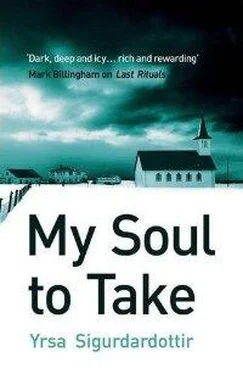“But how can one member of a committee sway its choice?” he asked. “The others must have some say as well.”
“Of course,” said Thóra. “But he has access to information that isn’t available to the other architects competing for the project, so he can find out the other members’ priorities and so forth. Although all design competitions usually have to stipulate the basic requirements, the winning proposal often deviates slightly from the original specifications. For instance, if an architect knows that the committee actually wants a larger building than they’re asking for”—Thóra shrugged—“he or she has a definite advantage. And I’m positive that one person can swing the rest of a committee if he’s a smooth talker who knows what he wants. I saw on one Web site that when Baldvin was at school, he was the debating champion two years in a row. He must be a very persuasive speaker.”
“So what are you going to do?” asked Matthew. “This isn’t watertight, and it doesn’t explain Eiríkur’s murder either.”
“Do you remember Baldvin’s e-mail in Birna’s diary?” Thóra asked.
“Yes,” Matthew said. “Are you going to mail him?”
“No,” Thóra said. “I’m considering taking a little chance.” She picked up the telephone. “I’m going to ask the police to search her computer for e-mails to Baldvin. They must have it in their custody, and it’s by no means certain that they would have been looking for e-mails to him.”
When the telephone was finally answered after a long wait, Thóra introduced herself and tried to sound as official as possible. “Could you put me through to Thórólfur Kjartansson, please? I know it’s late, but this is in connection with the murders on Snæfellsnes. I need to pass on an urgent message, or preferably speak to him in person.”
She whistled along with the Muzak on the line as she waited to be connected. After a while it stopped and a weary Thórólfur said, “What?”
Thóra lay on the bed with her arms around her daughter. She had carried her—fast asleep—out of Gylfi and Sigga’s room and into her own, more from fear that Sigga would give birth all over her daughter than anything else. Matthew had moved back to his room without protest, and she was extremely grateful because she had quite enough to occupy her mind. Mainly she was apprehensive about the following morning, afraid that Thórólfur would not take the bait, which would leave her little more to do for Jónas than put up a standard defense. That was an awful prospect.
More thoughts plagued her, though. If either Magnús or Baldvin had murdered Birna, there was no visible explanation for their wanting to kill Eiríkur, nor any link with them. Was he Birna’s accomplice? What purpose did the fox serve, and what did “RER” mean, if anything?
Kristín was bothering her most. Thóra had discovered that she was Gudný’s daughter, but that seemed irrelevant to the case. More thoughts crowded her mind but she was too tired to focus on them and they soon merged into one amorphous mass: coal, walls, horses, deeds of sale, lapsed claims, a broken leg . . .
She woke with a start to the sound of a baby crying. In a daze, she freed her arm from beneath her sleeping daughter’s head and sat up. The sound came again and she got out of bed and went to the window, but could see nothing in the half-light. Somewhere out there, the strange wailing resumed, then stopped as suddenly as it had started. Thóra shut the window and arranged the curtains securely to block the view outside. A newborn infant dragging itself along by one arm in bloodstained swaddling clothes suddenly did not seem as preposterous as it had when she was teasing Matthew. She jumped back into bed with her daughter, determined not to mention this to anyone. She must have imagined the whole business. Through the closed window, she vaguely heard the pitiful crying start up again.
Tuesday , 13 June 2006
Dressed in a black robe trimmed with dark blue satin, the judge glared at Thóra. He had cupped his hands over his chin, covering his mouth, and she felt he might just as easily be poking his tongue out at her behind them, or hiding a grimace of boredom. “Would the defense counsel please continue,” he boomed. “This is most interesting.”
Thóra smiled politely. “As I have pointed out, I came across this piece of evidence by sheer coincidence and informed the police of its existence immediately. I reject the prosecution’s argument that I should have contacted them before removing the photograph, because I couldn’t tell what significance it would have for the investigation until I saw what it showed. To do so, I had to remove it. I took every precaution not to disturb anything and touched it only with tweezers.”
“CSI: Miami?” asked the judge, and removed his hands from his mouth. He smiled at Thóra.
“Yes, you could say that,” said Thóra, smiling back.
The judge turned to the official from the district commissioner’s office, which had requested that Jónas be detained in custody. “It appears that the commissioner’s office did not make a proper investigation. Instead of objecting to the defense counsel’s arguments, you ought to thank her for her assistance, otherwise the photograph in question might never have come to the notice of the authorities.”
The official asked permission to respond and stood up. “It’s true that we welcome this piece of evidence, and of course we shall examine this new angle on the case. An officer was sent to the scene immediately, even though this happened late last night, and the photograph is being examined as we speak.” He cleared his throat. “However, we see no reason to reject the request to remand the suspect on these grounds alone. His alibi is inadequate, and he is still the chief suspect in these heinous crimes. The photograph alone does not alter that fact.”
“How do you answer this, counsel?” the judge asked Thóra.
“The photograph is far from being the only evidence. Baldvin Baldvinsson’s car went through the Hvalfjördur Tunnel on Sunday at 17:51. That would have taken him to Snæfellsnes in time to commit the second murder, even though he denied to me ever making that journey. The police presumably have a comparable list of traffic for the day that Birna was murdered, and I am informed that Mr. Baldvinsson was also present at the hotel on that day. He attended a séance that was held in the evening but left before the interval, which means that he had every opportunity to kill Birna. The police are undoubtedly in possession of e-mail communications between Baldvin and Birna, but I have not been given the chance to see them, or indeed any other evidence apart from the list of traffic through the tunnel on Sunday, which they were kind enough to pass to me.” Out of the corner of her eye, Thóra saw Thórólfur shift in his seat. He was clearly burning to correct this fabrication, but the only way to do so was to admit that he had accidentally left the list behind, so he had to restrain himself.
Thóra continued, “I should also point out that Eiríkur may have intended to abbreviate the name of Reykjavík on the wall but did not manage to write the final letter correctly. The K may have come out as an R. It should be remembered that throughout his efforts a crazed stallion was in the process of trampling him to death. ‘R-E-K’ could refer to Baldvin’s position as a Reykjavík city councilor. REK is a common abbreviation for Reykjavík.”
The judge nodded slowly. “We should not jump to conclusions. Baldvin Baldvinsson is a city councilor and his grandfather Magnús a former cabinet minister, so we should be very wary of insinuating that they are guilty of a serious breach of the law. I need not elaborate on the consequences if such a notion became public without reason.”
Читать дальше












